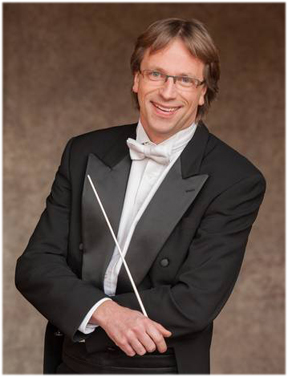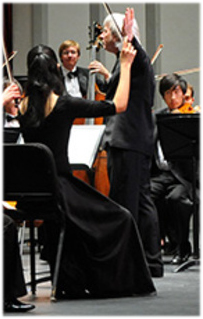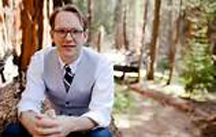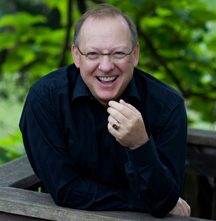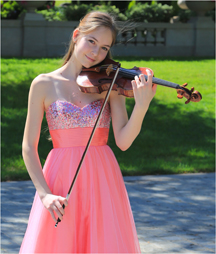By Robert D. Thomas
Music Critic
Southern California News Group
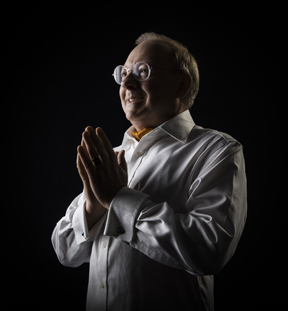 Nicholas McGegan (pictured right) has been coming to Hollywood Bowl as a valued guest conductor for 20 years and we have had the privilege of watching him grow during those two decades. Originally he was advertised as an early-music specialist and, indeed, his all-Handel concert Tuesday night reinforced that image.
Nicholas McGegan (pictured right) has been coming to Hollywood Bowl as a valued guest conductor for 20 years and we have had the privilege of watching him grow during those two decades. Originally he was advertised as an early-music specialist and, indeed, his all-Handel concert Tuesday night reinforced that image.
However, in the past few years McGegan — especially in his role as Principal Guest Conductor of the Pasadena Symphony —has been pushing his own envelope, expanding his repertoire into the Romantic era, as last night’s program demonstrated.
On paper, the program of Weber’s Overture to Oberon,, Mozart’s Piano Concerto No. 20 in D Minor, K. 466, and Schumann’s Symphony No. 3 (Rhenish) would seem to have a foot in both camps but the performances placed it squarely in the Romantic style.
That emphasis was aided by two short video conversations between McGegan and Scott Alan, curator of Unruly Nature: The Landscapes of Théodore Rousseau, an exhibit of Rosseau’s paintings showing through September 11 at the J. Paul Getty Museum. In the paintings and commentary — think of them as “preconcert lecture light” — McGegan and Alan discussed the musical pieces that might have influenced Rosseau whose time (1812-1867) almost exactly coincided with Schumann (1810-1856).
The Weber overture proved to be a sparkling opening to the evening, although the video interview — which was played while the piano was being moved onstage for the concerto — focused more on Der Freischutz as opposed to Oberon. Nonetheless, high marks to Jeffrey Fair’s horn solos that opening the evening, Burt Hara’s clarinet solo, and the rhythmic precision of the entire string section.
In the video clip, McGegan encouraged the audience to remember the dark, forest paintings of Rosseau as it listened to the transition from the Weber overture to Mozart’s D Minor Piano Concerto, one of the darkest in the composer’s repertoire.
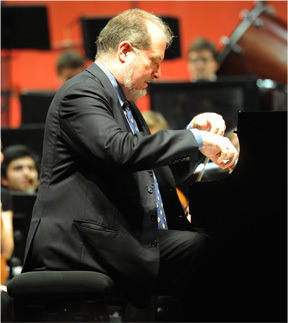 After a summer that featured both Lang Lang and Yuja Wang, it was a pleasure to watch and hear Garrick Ohlsson’s performance last night. Unlike his younger counterparts, there is a sense of serene calm to Ohlsson (pictured Left), who sits quietly on the bench while he plays, just letting the music weave its own magic spell. This was especially true in the famous “Romance” middle section, but even in the outer movements Ohlsson continued to project a sense of stillness during his pristine runs, trills and cadenzas.
After a summer that featured both Lang Lang and Yuja Wang, it was a pleasure to watch and hear Garrick Ohlsson’s performance last night. Unlike his younger counterparts, there is a sense of serene calm to Ohlsson (pictured Left), who sits quietly on the bench while he plays, just letting the music weave its own magic spell. This was especially true in the famous “Romance” middle section, but even in the outer movements Ohlsson continued to project a sense of stillness during his pristine runs, trills and cadenzas.
That atmosphere of serenity was even more apparent in Ohlsson’s exquisite rendition of Chopin’s Nocturne in F-Sharp Major, Op. 15, No. 2. For the second night in a row the Bowl seemed like an intimate concert hall with the skies opened to the heavens, a rare moment indeed (high marks, also, to Ohlsson for clearly articulating through a microphone the entire title of the Nocturne prior to playing it).
Despite the fact that this was Mozart, the concerto’s performance had a very “Romantic” feel to it. The orchestra was larger than what Mozart used and, of course, the Steinway grand on which Ohlsson played was a long way from the pianofortes that Mozart would have used when he first performed the piece in 1785.
However by the time of Beethoven — according to Susan Key’s program notes this was the only Mozart concerto Beethoven played in public — the piece would surely have sounded different and so it did last night. McGegan emphasized the work’s sweeping lines and dark textures, and the orchestra — with basses placed to the far right of the ensemble and the cellos directly to McGegan’s right — played with its customary level of excellence.
Schumann’s “Rhenish” Symphony — the subtitle refers to the fact that the composer had just moved to Düsseldorf, a city on the Rhine, in 1850 — continued the Rosseau-inspired theme.
In one sense, the piece looks backward — like Beethoven’s “Pastoral” Symphony, Schumann’s “Rhenish” has five movements. However, the work clearly introduces the “Romantic” symphonic concept to the world and McGegan’s take on the piece was, for the most part, straight forward in its concept.
In particular, he invested the fourth movement, Feirlich (“Solemn”) — inspired by the composer’s trip to the recently completed and majestic Cologne cathedral — with the proper sense of brooding awe, which provided a perfect contrast to his perky take on the concluding section. The Phil’s brass section — particularly the horns — were in fine form throughout the performance.
HEMIDEMISEMIQUAVERS:
• On Sunday cellist Yo-Yo Ma and his Silk Road Ensemble returns to the Bowl for a program of music spanning the globe — no surprise, since the ensemble is comprised of performers and composers from more than 20 countries. INFO
• On Tuesday, Ken-David Masur — son of Kurt, former Music Director of the New York Philharmonic and Leipzig Gewandhaus Orchestra — makes his Bowl debut in a program of Beethoven (Overture to Fidelio and Symphony No. 5 — and Korngold’s Violin Concerto with Gil Shaham as soloist. Masur is replacing Joana Carneiro, who was originally scheduled to conduct. INFO
• Then on Thursday, Bramwell Tovey returns for the first concert in a two-week stint on the podium, bringing a program of rarely performed movie music by Bernard Hermann, Leonard Bernstein, and George Gershwin, along with Pas de deux, a new double concerto by James Horner to be played by Mari and Håkon Samuelsen, the Norwegian brother/sister duo that commissioned the piece.
Tovey — the British-born conductor who in 2018 completes a 19-year tenure as Music Director of the Vancouver (BC) Symphony — once held the title of Principal Guest Conductor at the Bowl. In reality, he still, has that now untitled position since he is the only conductor to lead more than a week of Bowl concerts. Expect some witty commentary along with the music. INFO
• McGegan will conduct two concerts with the Pasadena Symphony in the upcoming season at Ambassador Auditorium, leading a Baroque program on January 21 and a Schubert-Mozart-Mendelssohn program on March 18. INFO
_______________________
(c) Copyright 2016, Robert D. Thomas. All rights reserved. Portions may be quoted with attribution.
